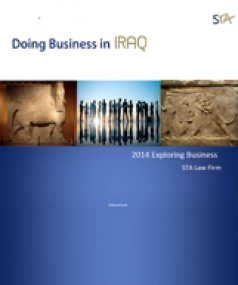Company Formation in Iraq
 The Companies Law Number 21 of 1997 (amended by CPA Number 64 in 2004) (the "Companies Law") permits various types of corporate entities to be registered in Iraq (including the Kurdistan Region of Iraq).
The Companies Law Number 21 of 1997 (amended by CPA Number 64 in 2004) (the "Companies Law") permits various types of corporate entities to be registered in Iraq (including the Kurdistan Region of Iraq).
The foreign investors who intend to enter the Iraqi market can use three main vehicles:
- Private limited liability company (LLC);
- Branch office of a foreign entity;
- Representative office of a foreign entity; and
- Mixed and Joint-stock companies
Limited Liability Company
The Companies Law permits the foreign investors to establish or participate in Iraqi companies without any restriction, provided they obtain the necessary approvals from Iraqi ministries or departments.
The following steps are required to establish an LLC under the Companies Law:
I. Submission of a completed application to the Companies' Registrar in Baghdad including the following main information regarding the business entity proposed to be registered at the Iraqi Ministry of Trade:
- Name of the business entity to be registered as an LLC;
- The type of business activity;
- The address, phone number, fax number and email address of the business and the address of the offices in Iraq;
- The structure of ownership (wholly Iraqi owned, wholly or partially foreign-owned);
- Memorandum of Association (MOA) as the governing document of the LLC.
The MOA must contain the following details:
- Name of the company;
- Form of the company;
- Objectives of the company;
- Address of the Head Office in Iraq
- Details of the founder(s) including the name, address, occupation and nationality; and
- Share capital.
Minimum Capital
In certain sectors, the minimum capital required could be higher than the standard minimum capital as in the oil sector where the minimum capital is IQD 2 Billion. However, the standard minimum capital for an LLC is IQD 1,000,000 with the nominal value mandated to be one Iraqi Dinar per share. Issuing of shares with a higher or lower value is prohibited under the Companies Law, and the share capital must be fully paid up when the LLC is registered. Cash must be paid into an authorized bank's account in Iraq, and such contribution is frozen in the account until documents are submitted to the bank ensuring the completion of the establishment formalities. Contributions in kind must be specified in the MOA, and the value must be approved by all the founders.
Shareholders
 The shareholders in an LLC must not exceed 25, which may be a combination of legal entities and individuals. There is no minimum requirement of shareholders, thus meaning that an LLC may be established by a single person (including a legal person).
The shareholders in an LLC must not exceed 25, which may be a combination of legal entities and individuals. There is no minimum requirement of shareholders, thus meaning that an LLC may be established by a single person (including a legal person).
The share capital is divided into indivisible shares with a uniform nominal value. The transferring of shares is subject to a pre-emption right in favor of the other shareholders.
Management
The LLC is managed by a General Manager who can also be a non-Iraqi national approved by the Iraqi Ministry of Interior (MOI).
The General Assembly lays down the powers and salary of the General Manager. A General Manager is authorized to conduct all transactions and business concerning the performance of the company's normal corporate activity.
The manager may be decided to be removed by the authority that appointed him/her by giving a reason for such a decision.
Liability of Partners
The liability of the partners towards third-parties is limited by law to the extent of their investment in the LLC's capital.
The Companies' Registrar should obtain the approval of the MOI prior to issuance of a registration certificate for an LLC that is owned by foreign parties. Such approval often takes between three to six months. After obtaining the approval from the MOI, and receiving the registration certificate, the LLC can operate throughout Federal Iraq.
In summary the steps involved are:
- Reserving a company name with the Chamber of Commerce and Federation of Chambers of Commerce in Baghdad.
- Drafting of the company's Articles of Association
- Depositing the initial capital with a commercial bank and obtaining the relevant document evidencing completion
- Obtaining the shareholders' tax clearance certifications from the General Commission of Taxation
- Submitting the required documents to the Companies' Registrar
- Obtaining the Registration Certificate
- Creating a company seal
- Registering for taxes with the General Commission of Taxation
- Legalizing the accounting books
- Registering the employees for social security
Branch Office and Representative Office of a Foreign Entity
A foreign parent entity may establish a branch office in Iraq, provided the parent company has secured a contract from the Government of Iraq, or a contract with a prime contractor who is contracted with the Government of Iraq. A branch office can conduct the commercial activities permitted by its parent company and is also bound by the operations specified in the contract upon which it relies to establish its presence in Iraq.
A representative office can only engage in business development and marketing activities, and thus, cannot engage in any commercial activity in Iraq. However, a representative office can be converted to a branch office on securing a government contract, or a contract with a prime contractor of the Government of Iraq.
Procedure:
The procedure for establishing a branch office and a representative office is similar.
A completed application to register branch office, or a representative office must be submitted, including the following:
- The legal name of the foreign parent company;
- Trade name of the foreign parent company;
- Foreign parent company's type of business activity;
- The business address of the foreign parent company's office in Federal Iraq;
- Telephone, facsimile and electronic mail in Iraq, where available;
- The foreign parent company's amount of charter or authorized capital;
- Foreign parent company's net worth at the end of the recent financial period;
- The names and addresses of any owners holding 10 percent or more of the foreign parent company's equity.
The time taken for registering a branch office or a representative office often takes between one to two months from the date of submission of the necessary documents.
For setting up a Joint-Stock Company, the minimum number of partners required are 5 who participate by owning shares through a public subscription, and the maximum number of partners is 100. The liability of the shareholders is limited to the nominal value of the shares to which they have subscribed. The minimum capital required is IQD 2 million.
Registration in the Kurdistan Region of Iraq
The Companies Law applies to the Kurdistan Region of Iraq, permitting for 100 percent foreign ownership. It is vital to note that the Erbil's Companies Registrar does not require a government contract for registering a branch office. The incorporation of an LLC or a branch office in the Kurdistan Region of Iraq considerably takes lesser time as it can be completed between two to four weeks.
For an LLC which is partially or wholly owned by a foreign entity, the foreign entity must have been incorporated for more than one year. The following documents must be translated to Arabic and certified at the Iraqi embassy in the foreign entity’s home country:
- The foreign entity’s Articles of Association;
- The foreign entity’s Certificate of Incorporation;
- The foreign entity’s most recently filed financial statements; and
- Resolution to own an LLC in the Kurdistan Region.
The branches of foreign companies which are registered in the Kurdistan Region cannot operate in Federal Iraq. The parent company must have been incorporated for more than a year in order to register a branch in the Kurdistan Region. A branch of a foreign oil services company does not have to secure a contract with an operating oil company for a pre-approval on its registration by the Ministry of Natural Resources.
The entities are required to register with the Income Tax Directorate (ITD) in the Kurdistan Region for corporate income taxes, and the current corporate income tax rate for all industries is 15 percent. The Kurdistan Income Tax Law Number 26 of 2007 amended by Law Number 20 of 2011 are silent about loss carries forwards. However, as per the Iraqi Income Tax Law Number 113 of 1982 as amended in 2003, the losses incurred during the year may be carried forward for a maximum of five consecutive years, to be off-set against profits generated from the same source as the original loss.
The entities registered in Kurdistan Region must register with the ITD for employment taxes for their employees working in Kurdistan, and these employees are subject to personal income tax at a rate of 5 percent on their income in excess of IQD 1,000,000 per month.
There is currently no VAT or sales tax levied on goods or services in the Kurdistan Region.
Free zones
Iraq currently operates:
- Khor al-Zubair Free Zone;
- Falafel Free Zone; and
- Al-Qayim Free Zone
The activities which are permitted in the free zones are:
- Industrial Process;
- Storage;
- Transportation;
- Trading;
- Banking; and
- Insurance.
 The first step is to submit a completed application for approval to the Iraqi Free Zone Authority. After obtaining the approval, physical space must be rented in the specific zone within a period of 30 days from the date of approval.
The first step is to submit a completed application for approval to the Iraqi Free Zone Authority. After obtaining the approval, physical space must be rented in the specific zone within a period of 30 days from the date of approval.
It takes an average of 4 months to set up a company in the Free zone. The Free zones can be 100 percent foreign owned with the minimum number of directors as one and the minimum number of shareholders is also one.
The imported goods into the Free zones for usage inside Iraq are subject to 5 percent reconstruction levy. The income of the Free Zones' foreign employees is exempt from all taxes and only the Iraqi employees are subject to 50 percent tax exempt.
The income from investment in these Free zones are exempt from the following:
- Corporate Tax
- Custom Duties
- Value Added Tax
- Capital Gains Tax
While there are no foreign exchange restrictions applicable to Free zones, offshore banking is allowed in the Free zones.
 English
English
 عربي
عربي Русский
Русский 官话
官话 português
português
 Türk
Türk 













